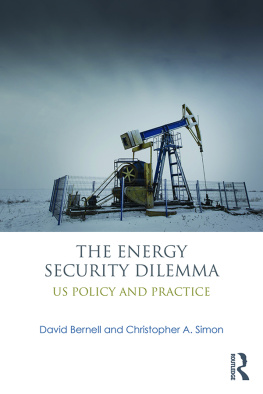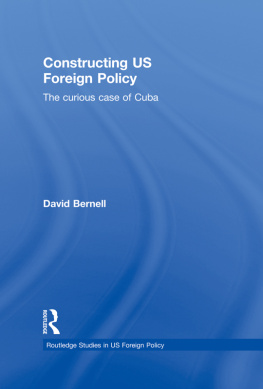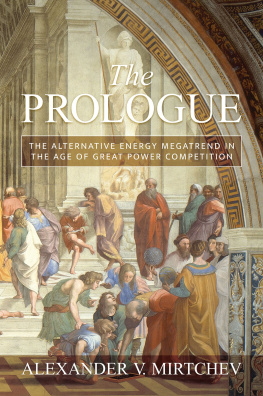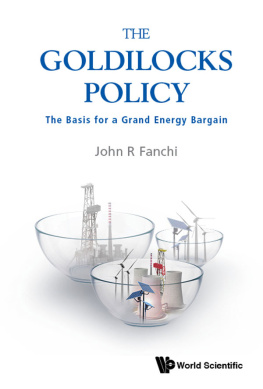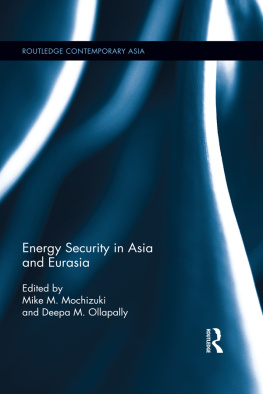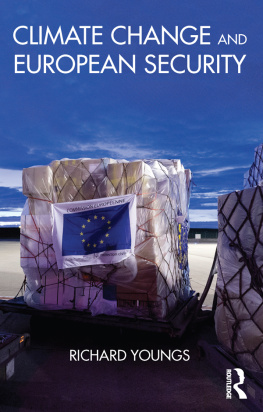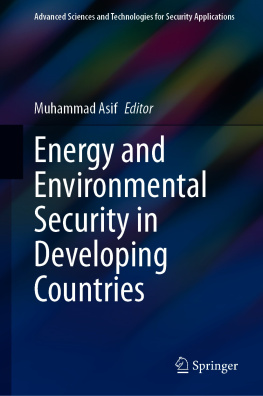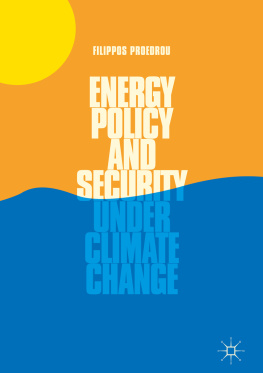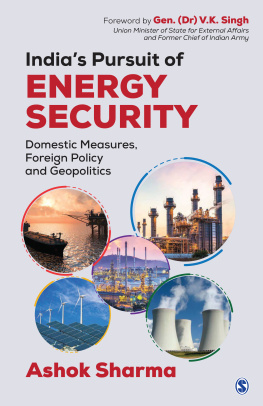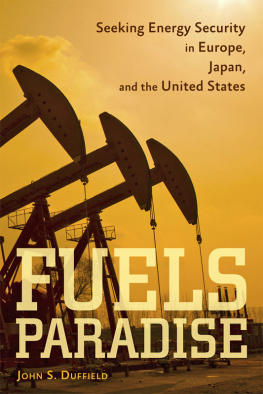An articulate and novel take on energy security both as an analytical concept and as a lens through which to examine the complex dynamics and values affecting energy trends in the United States. Important reading for anybody seriously interested in the future of energy security in the United States, especially those striving to make Americas energy system more environmentally friendly, renewable, and truly secure.
Benjamin K. Sovacool, University of Sussex, UK
A major contribution to the energy security literature. Bernell and Simon are rare boundaryspanners who have been operating at the intersection between the worlds of practice and the academe (Bernell), and between the worlds of science and engineering and social science policy studies (Simon) for over two decades. Energy security policy necessitates a broad range of knowledge and experience, and this book captures the insights generated from this truly collaborative work reflecting a remarkable scope of familiarity with the political, economic and scientific dynamics of energy security.
Nicholas Lovrich, Washington State University, USA
Bernell and Simon have crafted an engaging and thoughtful examination of energy security that both captures the twentieth-century geopolitical roots of the topic and ties them to the emergent needs of the globalized twenty-first-century. Its a brave volume that isnt afraid to tackle incongruence and contradiction with candor and insight, in one of the central political conflicts of our era.
Adam L. Reed, University of Colorado-Boulder, USA
THE ENERGY SECURITY DILEMMA
This book analyzes the energy security of the United Statesits ability to obtain reliable, affordable, and sufficient supplies of energy, while meeting the goals of achieving environmental sustainability and protecting national security. The economic and national security of the United States is largely dependent upon fossil fuels, especially oil. Without significant changes to current practices and patterns of energy production and use, the domestic and global impactssecurity, economic, and environmentalare expected to become worse over the coming decades. Growing US and global energy demands need to be met and the anticipated impacts of climate change must be avoidedall at an affordable price, while avoiding conflict with other nations that have similar goals.
Bernell and Simon examine the current and prospective landscape of American energy policy, from tax incentives and mandates at the federal and state level to promote wind and solar power, to support for fracking in the oil and natural gas industries, to foreign policies designed to ensure that markets and cooperative agreementsnot armies, navies and rival governmentscontrol the supply and price of energy resources. They look at the variety of energy related challenges facing the United States and argue that public policies designed to enhance energy security have at the same time produced greater insecurity in terms of fostering rising (and potentially unmet) energy needs, national security threats, economic vulnerability, and environmental dangers.
David Bernell is Associate Professor of Political Science at Oregon State University, USA.
Christopher A. Simon is Professor of Political Science at the University of Utah, USA.
THE ENERGY SECURITY DILEMMA
US policy and practice
David Bernell and Christopher A. Simon
First published
by Routledge
711 Third Avenue, New York, NY 10017
and by Routledge
2 Park Square, Milton Park, Abingdon, Oxon OX14 4RN
Routledge is an imprint of the Taylor & Francis Group, an informa business
2016 Taylor & Francis
The right of David Bernell and Christopher A. Simon to be identified as authors of this work has been asserted by them in accordance with sections 77 and 78 of the Copyright, Designs and Patents Act 1988.
All rights reserved. No part of this book may be reprinted or reproduced or utilised in any form or by any electronic, mechanical, or other means, now known or hereafter invented, including photocopying and recording, or in any information storage or retrieval system, without permission in writing from the publishers.
Trademark notice: Product or corporate names may be trademarks or registered trademarks, and are used only for identification and explanation without intent to infringe.
Library of Congress Cataloging in Publication Data
Names: Bernell, David, author. | Simon, Christopher A., 1968- author.
Title: The energy security dilemma : US policy and practice / David Bernell, Christopher A. Simon.
Description: New York, NY : Routledge, 2016.
Identifiers: LCCN 2015042151| ISBN 9780415890540 (hardback) | ISBN 9780415890557 (pbk.) | ISBN 9780203817797 (ebook)
Subjects: LCSH: Energy securityUnited States. | Energy policyUnited States.
Classification: LCC HD9502.U52 B477 2016 | DDC 333.790973dc23
LC record available at http://lccn.loc.gov/2015042151
ISBN: 9780415890540 (hbk)
ISBN: 9780415890557 (pbk)
ISBN: 9780203817797 (ebk)
Picture the authors of this book, one in Corvallis, Oregon and the other in Salt Lake City, Utah, sitting at tables in coffee shops where they like to write. This is a common scenario for them, and for many of us. On one day one of the authors, David, turned to a woman sitting nearby him and said Excuse me, could I please use the electrical outlet to plug in my laptop? Its running out of power. On that particular day, the demand for electricity had exceeded the supply of electrical sockets. The irony, he said, is that Im writing a book about energy security, but I dont have enough energy security to write the book!
The truth, in this case the truth of the societal importance of energy, gets revealed in many, often mundane ways, such as in finding a nearby outlet, and irony is a particularly powerful force in revealing truth. The central idea put forth in this book is that in the United States, our seemingly insatiable demand for energy, at all times and in just about all places, with minimal cost and adverse impact, presents a major public policy dilemma. We cannot have everything we want, and difficult tradeoffs cannot be avoided despite continuing breakthroughs in technology and ever more alternative energy sources being developed. There is always a tradeoff and a price to pay, whether these things are acknowledged or ignored, paid in full, in part, or pushed off onto others to pay. In the case of the coffee shop electricity supply problem, the tradeoff was simplea little demand management solved the problem, whereby the woman sitting near David removed her power cord from the socket and allowed him to use it for a while to charge up his computer.
On a much larger scale, however, in thinking about energy security as a challenge with which we grapple as a nation, the tradeoffs and costs are much more significant, and the problem itself eludes a simple solution. The contradictions are all around us. On the one hand, the world is literally awash in energy of all types. The end of fossil energy may or may not be on the near horizon, but for the time being, massive consumption goes forth on a global scale. As of 2015, the world is regularly consuming, on an annual basis, almost 32 billion barrels of oil (which translates into the more well-known figure of 90 million barrels of oil per day), more than 8 billion short tons of coal, and over 120 trillion cubic feet of natural gas, although the latter statistic is, at the very best, an informed guess given the unknown quantities of natural gas that are simply flared off at petroleum well facilities. The world procures almost 60 thousand tons of uranium ore per year used to produce radioactive fuel rods for nuclear power plants and, incidentally, nuclear weapons. And, of course, electricity continues to flow every day. Over 20 trillion kilowatt hours of electricity were consumed worldwide in 2014, and that figure will continue to grow as the developing worldparticularly the BRIC countries (Brazil, Russia, India and China)gain greater access to the benefits of a middle class lifestyle.1

